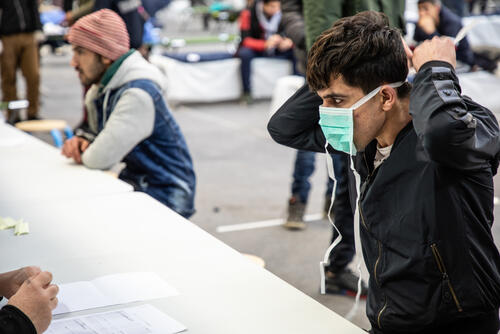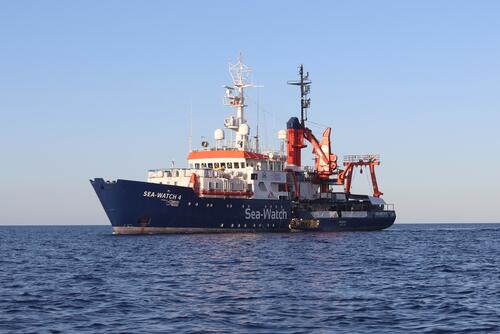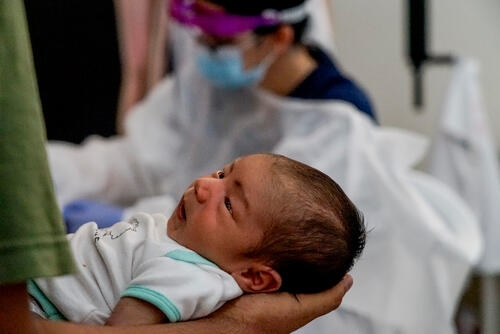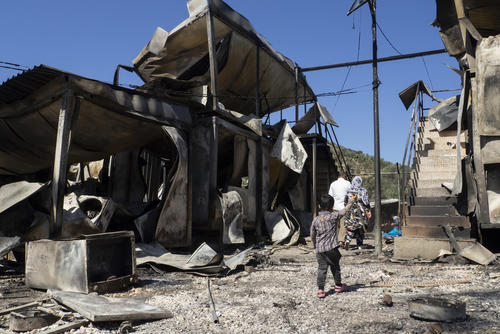Médecins Sans Frontières (MSF) has expanded activities in response to COVID-19 in Italy, Spain, Switzerland, France, Norway, Greece and Belgium.
Our teams are supporting nursing homes for the elderly, assisting other vulnerable people, such as the homeless and migrants, and providing technical support and training.
Describing our COVID-19 response in Europe, Dr Christos Christou, MSF international president said:
“As an emergency humanitarian organisation, MSF provides medical assistance to vulnerable people in a moment of crisis and societal disruption. Today, in Europe some of the most advanced health systems in the world are buckling under the pressure of the COVID-19 pandemic. Responding to epidemics is at the core of what we do – intervening when the system is overrun and where we can put our expertise in managing emergencies to good use.”
MSF activities across Europe
Helping the elderly
Elderly people are among the most vulnerable to severe infection from COVID-19. In Italy, Belgium and Spain, we have extended activities to support nursing homes for the elderly. People often live close contact in these facilities, which do not usually have specialised medical equipment.
In the Marche region of Italy, MSF doctors, nurses and hygiene experts are supporting staff and local municipalities to set up infection prevention and control (IPC) measures. In Spain, we are advising nursing homes on case management, risk assessment and the implementation of IPC. In Belgium, we are carrying out health promotion and IPC measures in nursing homes in and around Brussels.
Supporting migrants, refugees and the homeless
In Belgium, France and Switzerland, we are assisting vulnerable groups, such as the homeless and migrants, living in precarious conditions, People living in overcrowded conditions, on the streets, in makeshift camps or in substandard housing are at particular risk.
Many are already in poor health, often as a result of their poor living conditions. Viruses thrive in areas with poor water and sanitation. In addition, many of these marginalised groups are excluded from the formal healthcare system.
In Brussels, we have set up a 50-bed facility, with the capacity to increase to 150 beds. The centre provides a space in which migrants and homeless people can isolate, receive medical care and be transferred to hospital.
In Paris and surrounding areas, our teams are intervening in emergency shelters, helping detect those who are potentially ill with COVID-19, in the coming days the team plans to expand activities to provide consultations to people living on the street.
In Geneva, we are providing logistical and health support for vulnerable groups living in precarious conditions, and training to staff and volunteers working with these groups.
Supporting hospitals and keeping healthcare workers safe
In Spain, MSF has set up two health units with a capacity of more than 200 beds to support hospitals in Madrid. The units support the hospitals’ emergency services by taking moderate patient cases, so that the emergency rooms and intensive care units can focus on those who are most severely affected by COVID-19.
Managed by the medical staff of the hospitals, MSF is providing logistical support and a monitoring team for each. MSF is also advising health authorities as they develop temporary units to expand hospital capacity in Madrid and Catalonia – including two hospitals in Barcelona and in Vitoria.
In Belgium, we are supporting five hospitals in Hainaut and Antwerp provinces, providing technical advice and training, and we are ready to increase admission capacity.
In Switzerland, we are supporting the Geneva University Hospital (HUG), sharing expertise to help with the management of patients who have contracted COVID-19, and with the organisation of medical teams and services in the hospital.
Under the coordination of the HUG, we have a mobile medical team ready to provide home-based care to people with COVID-19, who do not meet the criteria for hospital admission. In collaboration with the City of Geneva, we have made recommendations to public and private mortuary services on procedures to avoid any post-mortem transmission of the disease.
We are also providing strategic advice and IPC support to a hospital close to Oslo, Norway, in an area that is home to one of the main clusters of cases in the country.
In Greece, teams are supporting isolation in Samos camp and evaluating the support that hospitals need.
In Lesbos, we have prepared an emergency plan for the Moria refugee camp, should the epidemic spread.
Further afield
MSF teams are also supporting COVID-19 activities in conjunction with health authorities from Afghanistan to Libya to Nigeria to Syria to Hong Kong.
We have seen how this virus has crippled some of the most advanced health systems in countries that have a social safety net and where most people have access to running water and space to self-isolate.
This is simply not possible for people in many of the countries where we typically work. Our greatest concern is that the virus takes hold in places with weaker health systems, where vulnerable people can’t protect themselves. International solidarity will be crucial, while the response to COVID-19 will have to be tailored to every setting and community, as well as to local capacities.
“Today, all levels of MSF are impacted, bringing new challenges, and requiring even more collaboration and creativity to find solutions. We’re adapting as quick as we can to prepare for COVID-19 in our projects around the world, despite the travel restrictions and supply shortages,” concludes Dr Christou.
Wherever we are in the world we are working to maintain healthcare activities in an increasingly challenging context of travel restrictions and constraints on the movement of goods.






